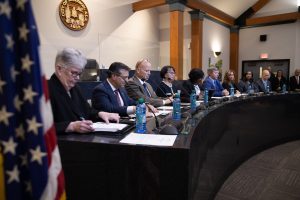Alabama’s controversial immigration bill’s rush to passage left many issues and concerns unaddressed
On June 9th 2011, Governor Robert Bentley of Alabama signed into law the country’s strictest immigration ruling to date. The law mandates, among other things, that primary and secondary schools must check residency status of children, and illegal immigrants are banned from state colleges and universities. The bill – H.B. 56, was passed by a large margin of the Republican-controlled Alabama Senate and House on June first and has become a controversial and heated issue among many of the states residents and civil rights organizations, including the Southern Poverty Law Center (SPLC) and American Civil Liberties Union (ACLU) who filed a lawsuit on July 8, charging Alabama’s racial profiling law as unconstitutional. In a recent statement, Alabama House Speaker Micky Hammon said, “It is important to note that our law seeks to protect immigrants who reside here legally while affecting only those who break our laws with their simple presence. We cannot turn a blind eye toward those who thumb their noses at our borders and our laws.” Arizona, Indiana, Georgia, and Utah have all passed similar laws with Federal lawsuits then filed against the five states.
The new law closely reflects Arizona’s SB1070, and would require police officers to check the immigration status of anyone they consider “suspicious” of not having proper documentation. The Alabama Immigration law would require public schools to determine a student’s immigration status, causing school officials to act as immigration and custom’s enforcement agents. The law would utilize E-Verify, an internet based program run by the United States government that compares information from an employee’s employment eligibility verification form to data from U.S. government records. The law makes it a crime for anyone to give undocumented immigrants a ride. The bill also makes it a crime to knowingly rent housing to an illegal immigrant. It bars businesses from taking tax deductions on wages paid to unauthorized immigrants.
According to SPLC Legal Director Mary Bauer, the immigration law is unconstitutional on multiple grounds. “It will subject residents of Alabama – including countless U.S. citizens and non-citizens with permission to be in the United States – to racial profiling as well as unlawful interrogations, searches, seizures, and arrests that violate the Fourth Amendment,” Bauer said. “Alabama’s immigration law is blatantly unconstitutional and revisits the state’s painful racial past and tramples the rights of all residents.”
Some argue that the law is necessary because illegal immigrants are allowed to work without being required to make payroll deductions and file income taxes. Other’s feel that if someone chooses to live and work in the United States, they should go through the required processes to become legal citizens, learn the English language, and pay their dues, just like every American citizen does. Arizona residents are tired of desert killings on their borders and Mexican kidnapping rings. Georgia desires to put an end to increasing burdens on schools, hospitals, and social services by people who are in the country illegally.
The issue of illegal immigrants is certainly a hot topic and there are legitimate arguments on both sides of the issue. However, this law seems to have a lot of concerns that should have been addressed prior to passage in the Senate and House, and signed into law by Governor Bentley. The following points should be considered regarding this law:
• Because the law requires immigration status checks for workers any employer who employs illegal aliens would be against the law and would have their business licenses revoked. Many business owners feel it is not fair to make them responsible for such checks. Farmers who rely on undocumented farm workers for their seasonal harvests would be penalized as well. Right or wrong, agriculture in many places depends on undocumented farm workers. Such a law could have an adverse economic impact on the farmer and city business owner. That economic impact would trickle down to the consumer as well.
• With law enforcement officials allowed to request proof of immigration status during stops, detentions or arrests, the burden of immigration investigation would be shifted from the federal government to local authorities who many not have sufficient funding or expertise for such matters, and also raises the risk of racial profiling. In addition, the bill would land people in jail until their immigration status could be verified.
• Since the law makes it a crime for anyone to give undocumented immigrants a ride, good Samaritans could find themselves serving time in jail for taking an immigrant to the hospital, doctor, health clinic or church. This could obviously create an atmosphere of fear among undocumented immigrants and U.S. citizens alike.
• The law would greatly impact faith-based organizations throughout the state, restricting ministers from meeting their parishioner’s spiritual and physical needs, while criminalizing their acts of charity and service.
• The law would turn teachers, landlords, and community members for all intents and purposes, into immigration enforcement agents.
Perhaps Alabama legislators would consider the approach Utah has taken, which offset law-enforcement provisions with a state guest worker program to give illegal residents a way to come to Utah to lawfully work. The law requires immigration status checks of those suspected of committing felonies and serious misdemeanors, but gives police more autonomy when investigating perpetrators of lesser crimes such as traffic violations.
This is certainly an issue that has harsh consequences and will have a huge impact on civil rights, social justice, labor and faith based organizations. There are no easy answers regarding illegal immigration and although sound solutions are advised, they must be made after thoughtful deliberation with special consideration to the Constitution of the United States which protects its citizens and non-citizens.
















